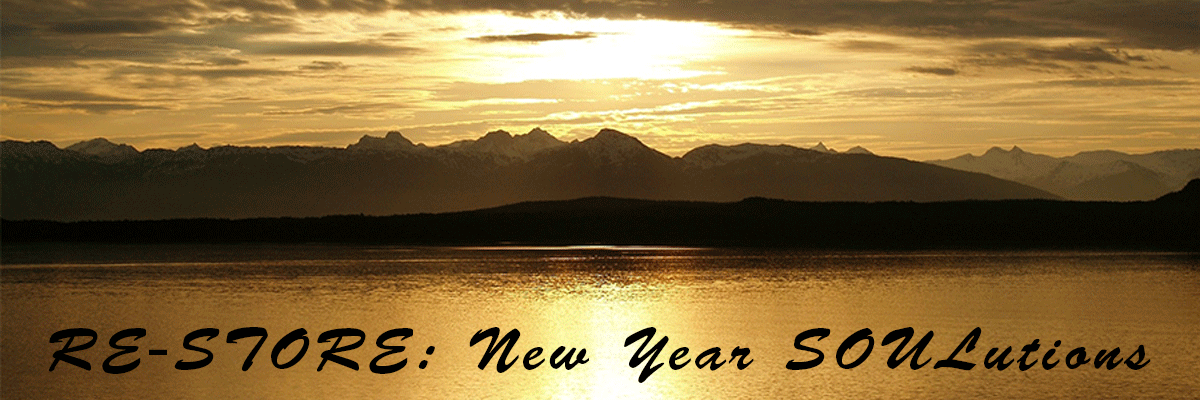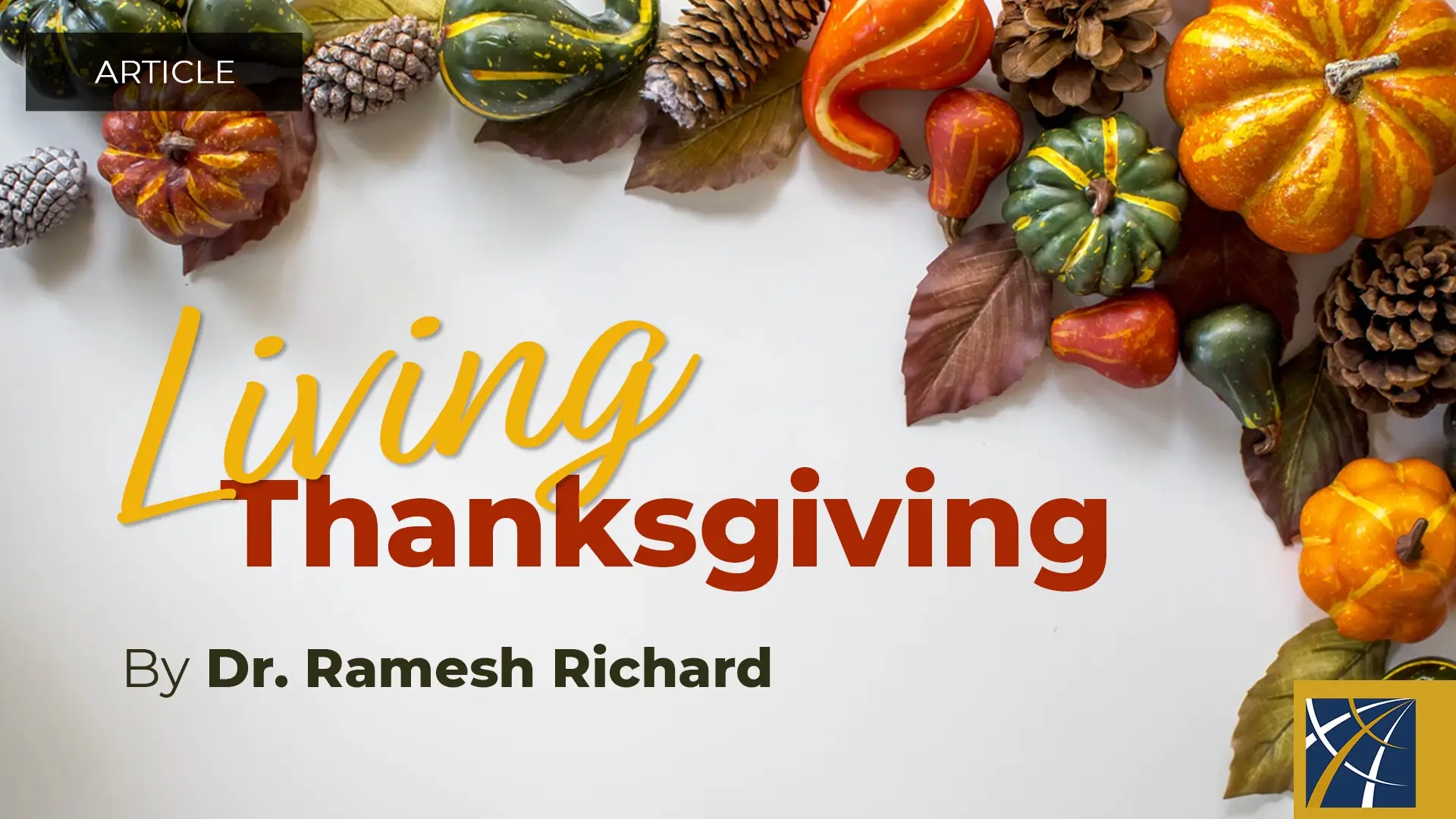January 2011
by Ramesh Richard
“The object of a new year is not that we should have a new year. It is that we should have a new soul,” said novelist and theologian G. K. Chesterton.
Of course, the change of a calendar date doesn’t instantly reset the soul. Yet it presents a fresh opportunity to re-store your soul.
My sub-title, “SOULutions,” is intentionally misspelled, pointing to a yearning of the human soul for solutions.
The “soul” in biblical language denotes the point of contact between the material and immaterial, the connection between the outside and inside, the link between the inner and outer person.
Let me share three challenging experiences of my soul over the past decade. If you can identify with these soul experiences, you also might resonate with the suggested biblical solutions—from Scriptural biography, theology and citation—for restoring your soul for the next season of life.
Flatness of Soul
Extensive back-to-back travel across multiple time zones and four continents, while constantly ministering in public and private to “make the most of every opportunity” simply flattened my soul one January.
My flattened soul was evidenced by a lack of creativity. In this vocation, whether in classroom or public presence, I need high-level creativity.
I possessed the will by the filling of God’s Spirit, and regular, light work-outs provided kinetic energy. But not a single creative thought was flowing from mind to soul to hand. Normally, I am filled with a hundred ideas, even awaking in the middle of the night to enter them on my PDA device, which sits on our night stand.
The SOULution I found to this “soul flattening” was simple. Like the angel advised a flattened Elijah after his greatest ministry victory (I Kings 19: 1-8), all I needed was some bodily rest and refreshment to rebound. I still remember bouncing back to fullness of soul on Palm Sunday that year. Ideas began to flow again. Under the control of biblical, spiritual and practical discernment, I have not since experienced soul-flatness.
Once I was rested, intellectual vitality returned and the ideas began to flow. I now attempt to balance pace and routine constantly. I want to balance the life referred to in the lazy man’s slogan, “Thank God for nights in which to sleep, and days in which to rest,” with the need to burn-up (but not burn-out) for God while obeying Him.
Sadness of soul
You might know the desolate feeling of being crushed—of living without hope of an end to your situation. Sadness of soul spills into sadness of countenance. I too have knelt beside my bed and groaned, grieved and grunted before God—sometimes, even growled.
This “dark night of the soul,” as Christian mystics have described it, can be short or last for years. Spiritual disciplines seem to be of no use. Theological truths are not realized personally.
Jeremiah likely experienced this sadness of soul when he emoted, “For these things I weep; My eyes run down with water; Because far from me is a comforter, One who re-stores my soul; My children are desolate, Because the enemy has prevailed” (Lam. 1:16).
The grief-stricken soul is often connected to loss—loss of control, relationships and dreams. Sadly, you even feel the loss of God’s vital presence. Two times in my life, separated by 17 years, I have experienced this dark sadness of soul.
I did ask God to take my life, for I knew enough theology to not take it myself. And I found I shared good company in that prayerful selfish wish—with Moses and Elijah and Jeremiah and Jonah. They too travailed in soul with God because of ominous situations and fateful scenarios.
I did the only thing I knew to do: go to the Scriptures, the only stable factor in life, because they speak God’s voice into our situations. I stayed in the Psalms and invite you to do the same into the New Year. I remember rehearsing the brilliance of Psalm 27:1 aloud:
THE LORD is my light and my salvation;Whom shall I fear?The LORD is the defense of my life;Whom shall I dread?
And taking hope in its last two verses:
I would have despaired unless I had believed that I would see the goodness of the LORDIn the land of the living.Wait for the LORD;Be strong, and let your heart take courage;Yes, wait for the LORD.
I wasn’t seeing the goodness of the Lord in the land of the living as yet, but my conviction that I would see it kept me from despair. I believed on and waited on the Lord, till He brought joy back to my soul.
Softness of Soul
Sitara, our daughter, was in a major wreck this past summer. Twenty days in the hospital and six surgeries softened my soul. In a bad way.
I lost courage. I found myself timid of soul. My boldness vanished. I became filled with unspiritual anxiety.
Annually, I select a verse that I claim for myself and send to friends on their birthdays. Early in 2010, God gave me 2 Timothy 1:7 knowing how much I would need it later. Paul writes to a soul-softened Timothy, “For God has not given us the S/spirit of timidity, but that of power, love and a sound mind.”
Notice, I capitalized Spirit. The human soul might experience softness, but God’s Spirit turns soul-softness into steel. I read the verse again, enjoyed its dimensions and claimed the Holy Spirit’s presence in my circumstance. The Spirit gave me what I needed—spiritual power, love and a sound mind.
Bonnie once went through a difficult season of soul-sadness, flatness and softness. She hung on to a verse of full, experiential value. It simply reads, “He re-stores my soul” (Psalm 23:3a).
The Psalmist, in the middle of his various soul-states, declares a re-storing of his soul. The mood of that promise-filled phrase is one of spiritual nourishment, emotional refreshment and personal presence. Even in the valley of the shadow of death, and throughout the days of our lives, His goodness and mercy will follow us.
As we enter another year, and this time another decade, join me in feeble faith to declare of our Shepherd-LORD: “He re-stores my soul.”






